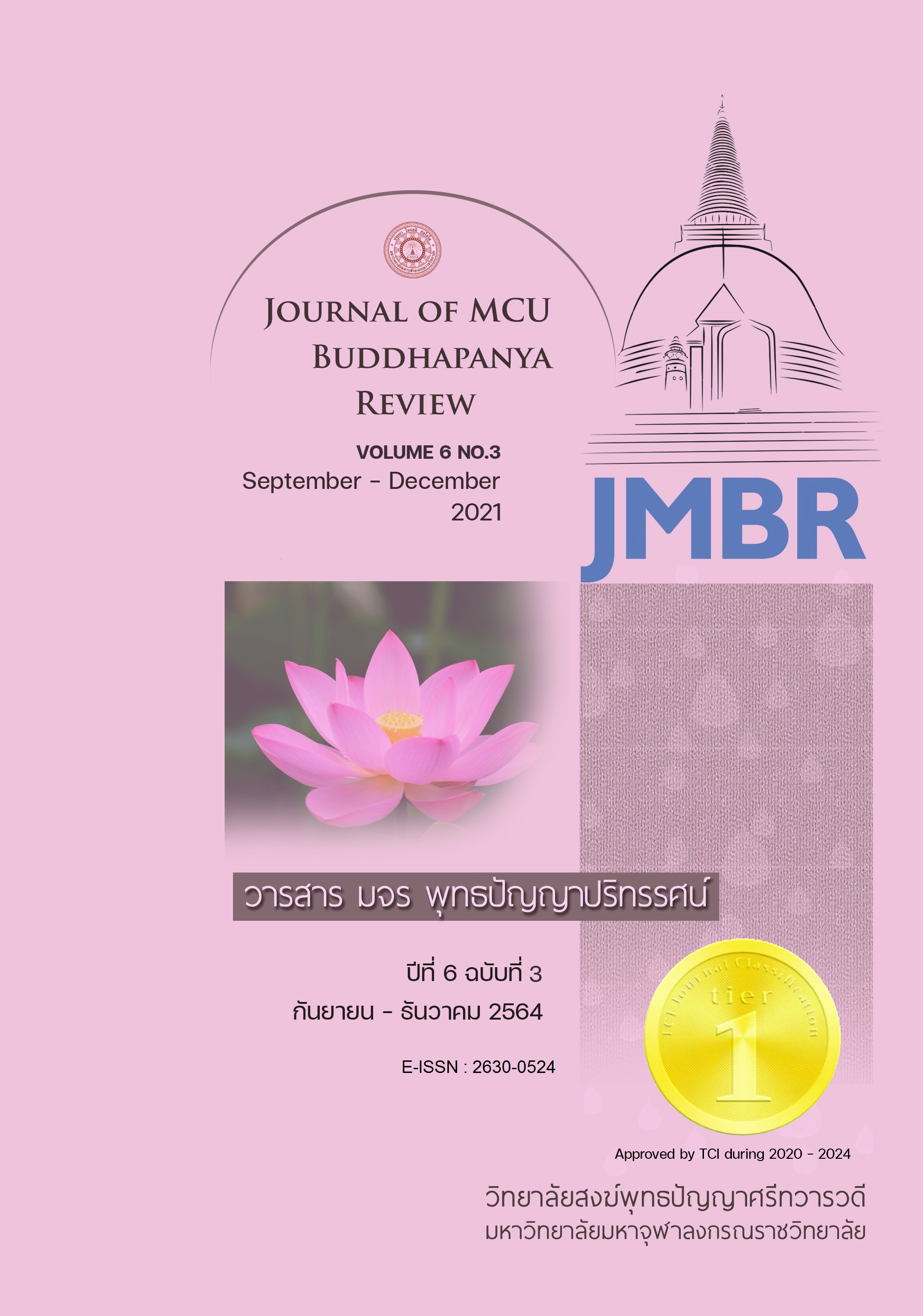ทักษะจำเป็นแห่งอนาคตการทำงานยุคหลังโควิด-19
Keywords:
essential skills, work performance, post COVID-19 eraAbstract
The objectives of this study were : 1) to investigate the skills that were essential for the work performance in the future when COVID-19 would be no longer existing, and 2) to ferret out the guidelines for use in the development of skills necessary for the work performance in the future when COVID-19 would have disappeared. The study was qualitative in character. The needed data were derived from textbooks, books, academic documents, previous studies, the internet, observations, and in-depth interviews with key informants. The key informants were comprised of public administrators, private executives, chiefs of government agencies, heads of private agencies, operating staff in the public sector, and operating staff in the private sector, totaling 20 persons. The key informants were purposively selected. The study tool was a structured interview guide and it was used for in-depth interviews. As a result of the data analysis, the following facts were discovered : The skills essential for the work performance in the future when COVID-19 would have come to an end comprised the following :
Skills of self-adjustment and flexibility, skills relating to creativity, initiative, skills relevant to making use of data, skills of analytic thinking, digital skills, skills pertaining to EQ, and skills concerning the lifelong learning. With regard to the skill development initiatives, they were as follows :
- Self-awareness. 2) Openness to new things. 3) Hands-on work. 4) Continual
Learning. And 5) putting the digital technology into practice.
References
ประสิทธิผลการปฏิบัติงานของพนักงานร้านสะดวกซื้อในเขตกรุงเทพมหานคร. วารสารเศรษฐศาสตร์ และกลยุทธ์การจัดการ, 6(2), 73-88.
จิราวรรณ อนุชาติ. (ม.ป.ป.). แนวโน้มของเทคโนโลยีสารสนเทศในอนาคต. สืบค้น 12 กุมภาพันธ์ 2563, จาก
https://jirawanmy.wordpress.com/เทคโนโลยีสมัยใหม่/
จุฑามาส โหย่งไทย. (2561). การพัฒนาทักษะการคิดเชิงวิพากษ์กับศตวรรษที่ 21. วารสารการบริหาร การศึกษา มหาวิทยาลัยศิลปากร, 9(2), 344-365.
รณดล นุ่มนนท์. (2560). แนวทางการใช้ประโยชน์จากการบูรณาการข้อมูลจัดตั้งคลังข้อมูลแห่งชาติเพื่อเพิ่ม ขีดความสามารถในการแข่งขันทางเศรษฐกิจ. กรุงเทพฯ: วิทยาลัยป้องกันราชอาณาจักร.
วีรวัฒน์ ปัณฑวังกูร. (2563). ทักษะแรงงานแบบไหนที่จำเป็นในโลกธุรกิจหลังยุคโควิด-19. สืบค้น 20 กุมภาพันธ์
2563, จาก https://www.prachachat.net/finance/news-477698
ศักดิ์ชัย จันทะแสง. (2563. ความสัมพันธ์ระหว่างความฉลาดทางอารมณ์ พฤติกรรมการเป็นสมาชิกที่ดีต่อองค์การ และความสุขในการทำงานของบุคลากรสายสนับสนุน มหาวิทยาลัยเทคโนโลยีราชมงคลกรุงเทพ. วารสาร Mahidol R2R e-Journal, 7(2), 115-128.
ศักรินทร์ ชนประชา. (2563). การศึกษาตลอดชีวิต. วารสาร AL-NUR บัณฑิตวิทยาลัย, 14(26), 159-175.
สุจิราภรณ์ ฟักจันทร์. (2560). แนวทางการพัฒนาศักยภาพแรงงานภาคอุตสาหกรรมการผลิตในจังหวัดปทุมธานี. วารสารวิชาการ มหาวิทยาลัยกรุงเทพธนบุรี, 6(1), 114-124.
สำนักงานนวัตกรรมแห่งชาติ (องค์การมหาชน). (2563). เปิดโลกมองเทรนด์ธุรกิจยุคหลังโควิด ปรับตัวอย่างไร ให้อยู่รอดแบบยั่งยืน. กรุงเทพฯ: สำนักงานนวัตกรรมแห่งชาติ (องค์การมหาชน).
Brightside People Team. (2561). 3 โครงสร้างองค์กรยุคใหม่. สืบค้น 15 กุมภาพันธ์ 2563, จาก https://www.brightsidepeople.com/3-โครงสร้างองค์กรยุคใหม่/
Prosofthcm. (ม.ป.ป.). แนวทางใหม่ในการบริหารบุคลากรยุคใหม่. สืบค้น 12 กุมภาพันธ์ 2563, จาก https://www.prosofthcm.com/Article/Detail/15610
Dressel, P., & Mayhew, L. (1957). General Education: Exploration in Evaluation. Washington. D. C.: American Council on Education.
Goleman, D., & Davidson, R. (2017). Altered Traits: Science Reveals How Meditation Changes Your Mind, Brain, and Body. New York: Avery Books.
Guilford, J. (1980). Cognitive styles: What are they?. Educational and Psychological Measurement, 40(3), 715–735.
Morrow, J. (2020). What Is Data Literacy?. Retrieved February 20, 2020, from https://
www.dataversity.net/what-is-data-literacy/
Kiley, M., & Cannon, R. (2000). Leap into…Lifelong Learning. Retrieved February 19, 2020, from http://digital.library.adelaide.edu. au/dspace/handle/2440/71214
Papadopoulos, N., & Oscar, M. (2010). Toward a Model of the Relationship between Internationalization and Export Performance. International Business Review,19 (4), 388- 406
Quinones, M., Ford, J., & Teachout, M. (1995). The Relationship between Work Experience and Job Performance: A Conceptual and Meta-Analytic Review. Personnel Psychology, 48(4), 887-910.
Sea (Group). (2020). ASEAN Youth 2020 “COVID-19: The True Test of Resilience and Adaptability. from https://www.sea.com/home.
Steele, B. (2009). Digital Literacy Project Teaches Students the Rules of the Online Academic World. From http://www.news.cornell.edu/stories/2009/12/project-teaches-rules-online-
academic-world
World Economic Forum. (2018). The Future of Jobs Report 2018. from
https://www.weforum.org/reports/the-future-of-jobs-report-2018
Downloads
Published
How to Cite
Issue
Section
License
Copyright (c) 2021 Journal of MCU Buddhapanya Review

This work is licensed under a Creative Commons Attribution-NonCommercial-NoDerivatives 4.0 International License.



